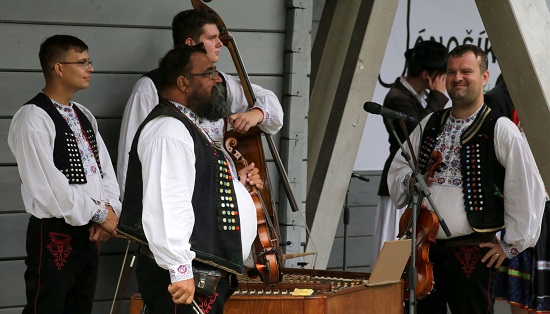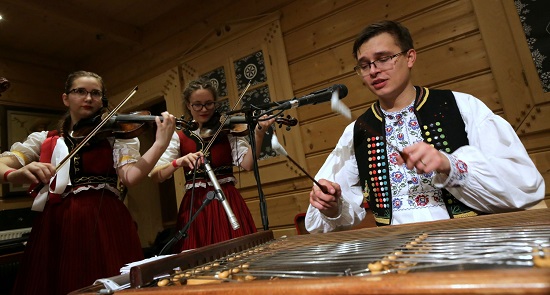The analytical thinking I acquired during my studies is invaluable in other fields as well
VSB – Technical University of Ostrava is your alma mater. Why did you choose this University for your studies? Were you interested in mechanical engineering from a young age, or did you choose purely according to the courses?
When choosing the ideal university for me personally, two things were crucial. I did not want to leave Ostrava because I had been playing in a dulcimer band since a relatively early age, and it would be difficult for them to go on without a dulcimer player. I wanted to do something that I would enjoy, and that would also help me to find employment in our region, where I decided to stay permanently. I knew one hundred per cent what I did not want to do, and VSB-TUO fulfilled everything I expected from a university. I have to be honest and say that I did not really know what courses we would take, and I do not even dare to say that I was passionate about mechanical engineering before I started. But I have always been interested in how things work, and at its core, mechanical engineering is actually a craft. And somehow, that has always been close to my heart.
We all have a childhood idea of our profession. What did you want to be when you were a kid? And what do you actually do professionally in your adult life?
A dustman, I think, but also a professional MonsterTruck driver. I work as an engineer at Paul Wurth Inc. and am finishing up my PhD studies at our University.
In addition, you are involved in folklore. Does engineering help you in this hobby/other job?
It is similar in many ways. When there is a problem, one must find the cause, eliminate it, and proceed to the solution. The analytical thinking I acquired during my studies and need every day at work is invaluable in other fields. The same is true about the ability to accept my mistake, an idea, or a better solution than yours. If it is to the benefit of the cause, it is not necessary to be stubbornly standing your ground. It is always about teamwork and the result.

When exactly was the idea born in you that you wanted to organize a folklore festival?
I have been thinking about it since 2016. When I was at Erasmus in Timisoara, Romania, for the second time and I went swimming in the pool every day. Back then, I had a break from the band, the ensemble and a lot of free time because I did not devote myself to my usual hobbies and responsibilities. Somewhere in my head, I had the idea that it could be fun. Ostrava has been and always will be a cosmopolitan city, and many people may not know it. Still, there are an incredible number of folklore groups, bands and associations that are dedicated to their roots. The only problem is that they hardly know each other, and the community is, let us say, fragmented. With our festival, we have the ambition to correct this, to connect these “fragments”, and to present all this on stage to the audience – to the people of Ostrava, but also people from outside. We want to show the audience mainly what we have at home – something in the sense of from the locals for the locals, actually for everyone.
Are the preparations for the festival demanding? What is the most difficult for you?
To be honest, yes, they are. You have to carry a lot of information, deadlines, ideas and other things around in your head, but luckily we have a great team of people, so I am not alone. In fact, sometimes I feel that if I did not interfere, it would all work even better. The hardest part for me is letting others do what we agreed on. I would prefer to do everything myself, but I could go crazy in a week, and it certainly would not do any good. And probably the second most challenging thing is finding at least a little bit of time daily to implement what we agreed with the team.
How did you get into folklore? Did your parents steer you towards it from a young age?
Yes, my parents encouraged me to be involved in folklore from a young age. They are the leaders of the Folklore Ensemble Šmykňa. Folk traditions, customs, and folklore, whether in music or other forms, were always somehow around. I do not remember being outright forced into it, instead, it just sort of came out, and neither my brother nor I ever resisted it in any way.
Did you choose to play the dulcimer yourself, or did your parents bring you to it? Can you play any other musical instrument?
That is the other thing that sort of flowed naturally. It was just kind of matter-of-course. You are going to be a dulcimer player, and I did not resist. Although I admit when I was a kid, I did not really want to practice. Later, of course, I developed a taste for other musical instruments. Gradually the guitar was added to the dulcimer, and also the double bass and accordion, and then at school, I started playing in a big-beat band, so I had to learn to play the bass guitar. As I got older, I became more interested in more traditional forms of folk music. I also became interested in the six-hole whistle, the end-blown whistle, and the queen of brass instruments, the Slovak overtone flute (fujara). I would not be able to play these instruments very well nowadays, but with conscientious practice, I would undoubtedly catch up.
But folklore is also connected to dance. How do you feel about dancing?
I always answer this question by saying that I only dance in self-defence, but actually, that is not true. I have a very positive attitude towards dance as towards any movement. Objectively, I have to say that I like dancing. You can dance everywhere and always, alone, with a partner or in a group. I just think people are afraid of it unnecessarily. It is a social event, and everyone can do the cabbage patch. Another added value besides the endorphins is that you need music to dance to, which is probably the best part of it all.
Back to Ostrava Folklore Days. Do you have the programme ready? What can people look forward to?
The rough cut of the programme is ready, but the idea is one thing, and the actual implementation is another. After all, the programme is mainly made by the performers, so we will gradually make it public, and for the moment, we will rather be secretive about it and create suspense. What I can reveal is that the whole festival should last five days and every day will be different. One day of the festival will be dedicated to the general public, where visitors will be able to get directly involved in various workshops and then also test their skills at the St Martin’s Folk Festival.
